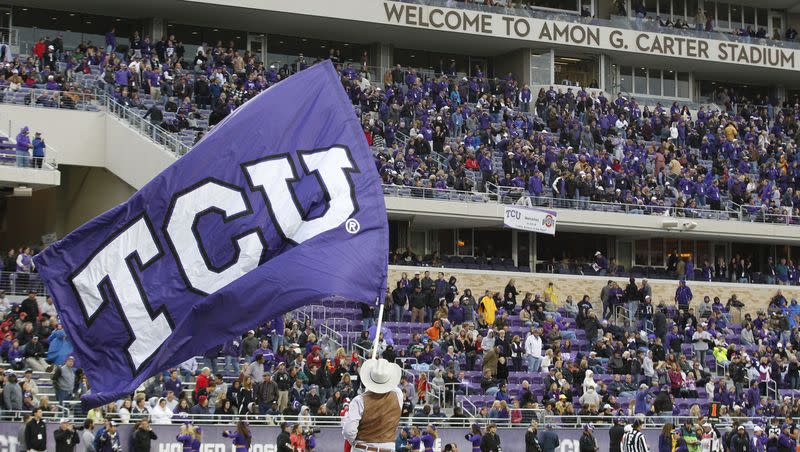Is TCU still affiliated with a church?

If you listen closely to ESPN’s broadcast of Saturday’s TCU-BYU game, you’ll hear plenty of facts about the two Big 12 programs.
You’ll hear about top players, key plays and recent wins and losses. You might even hear about the best places to eat in Forth Worth.
What you almost certainly won’t hear, though, is a mention of TCU’s full name.
In recent years, the school has made it clear that it prefers not to be referred to as Texas Christian University, as The Athletic reported in 2017.
Going off its self-presentation, “one might assume TCU (has) no religious affiliation at all,” the article said.
History of TCU
TCU was founded in 1869 in Forth Worth by a pair of “minister-teachers” who dreamed of “creating a college where men and women could acquire a classical education and develop character,” according to the school’s website.
Addison and Randolph Clark, who were brothers, initially named their school the AddRan Male and Female College. Within five years, they went from working with 13 students to 450.
Although they were thrilled with the growth, the Clarks didn’t have enough real estate at their disposal to serve a large and still growing campus community. They ended up turning to a religious organization for help.
“The Clarks forged an affiliation with the Christian Church (Disciples of Christ) to ‘adopt’ their school, giving it a new name and ensuring its future,” the TCU website explains.
In 1895, the school moved from Fort Worth to Waco, where it continued to evolve. It was rebranded as Texas Christian University in 1902.
Eight years after the formal name change, the school’s Waco facilities burned down and Texas Christian returned to Fort Worth. Over the past century, it’s kept growing and changing, while still staying connected to the Clarks’ founding vision.
“Today, the Horned Frog family includes approximately 11,000 students seeking the very same purpose of which our founders dreamed,” the school’s website says. “TCU began as a family endeavor — an enriching place of spirited belonging for men and women of character to acquire a liberal arts education and strive to serve the greater good. 150 years later, we are still that place.”
Is TCU a Christian school?
TCU remains in a “covenant” with the Christian Church (Disciples of Christ), according to the TCU website.
“This continued relationship supports an approach to education that values scholarship, reason and intellectual inquiry while honoring the importance of every individual’s religious identity. Today’s TCU students come from more than 60 religious traditions and faiths,” the website says.
The Christian Church (Disciples of Christ) is in relationship with 14 other colleges of varying sizes, including Eureka College in Eureka, Illinois, and Tougaloo College in Tougaloo, Mississippi. It also supports seven divinity schools.
These 22 institutions receive funding from the Christian Church (Disciples of Christ), according to the denomination’s website.
Other schools, like Drake University in Des Moines, Iowa, have historic ties to the church but do not receive a share of the same funding.
Texas Christian becomes TCU
Although TCU remains linked to a church, there’s no doubt it’s rare to hear it referred to as “Texas Christian University” these days.
A 2017 article from The Athletic argued that the shift from Texas Christian to TCU was intentional and pointed to media guides handed out to football commentators as proof.
Campus stakeholders who spoke with The Athletic for that story said that going by TCU helps the school clear up some confusion about campus life.
One source for the story argued that the word “Christian” comes with a lot of baggage. “Texas” increasingly does, too.
“The main reason to (rebrand) is because the Texas part will alienate half your crowd, and the Christian part will alienate the other half,” said Billy Joe Gabriel, a big TCU fan, to The Athletic. “They’re not ashamed of being a Christian university. They’ll always be (Christian people).”
Similarly, Nadia Lahutsky, a longtime religion professor at the school, told The Athletic that going by TCU helps ensure the school will be associated with its own unique traits, rather than Christian stereotypes.
“The word ‘Christian’ should mean a whole bunch of different (things), but, over the last 30 years, it has gotten compressed into this narrower worldview which never, ever applied to TCU,” she said.
Lahutsky noted that Texas Christian University was always different than the kinds of schools that pop into your mind when you hear “Christian college.”
“Since about 1936, the school hasn’t had mandatory chapel,” she noted. Students are required to take a class related to religious traditions, but not a traditional Bible class as they did in the past.
“Those of us who come out of the Church of Disciples, we’re a little resentful (of the rebrand),” Lahutsky told The Athletic. “I’ll admit that was my initial response 25 years ago. (But) the more I thought about it, the more the move made sense.”
It makes even more sense if you consider how many sports fans were already exclusively referring to Texas Christian University as TCU before the school’s unofficial rebrand. Gabriel alluded to public support for the shorter name in his interview with The Athletic.
“It’s also easier to not say, like, 20 syllables,” he said.
It is indeed easier. That’s why viewers of Saturday’s TCU-BYU game won’t hear BYU’s full name, Brigham Young University, very often either.

